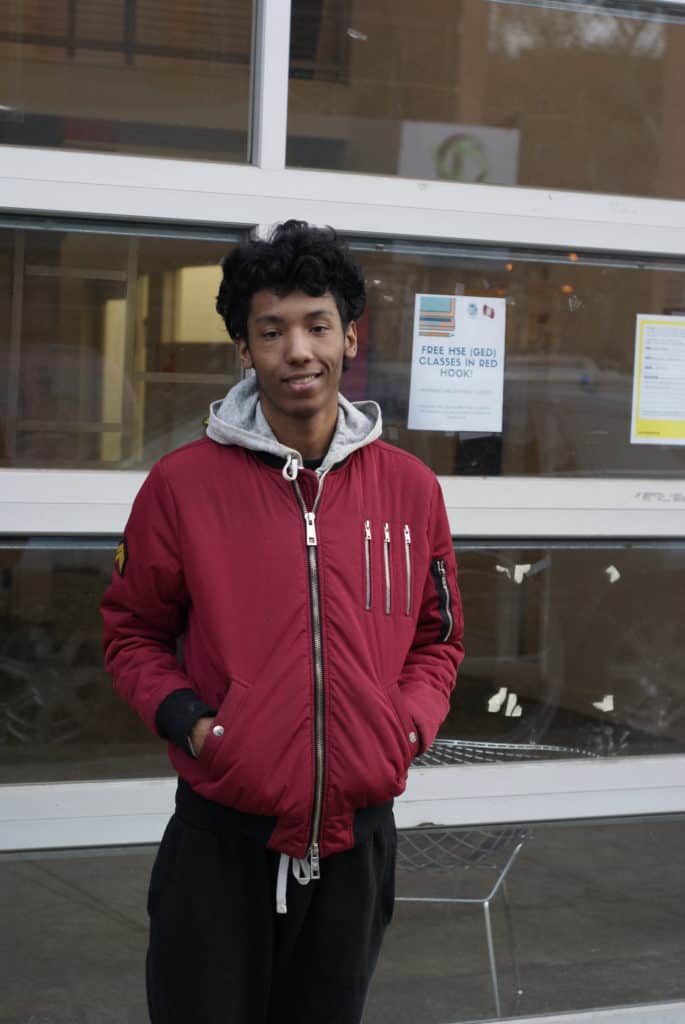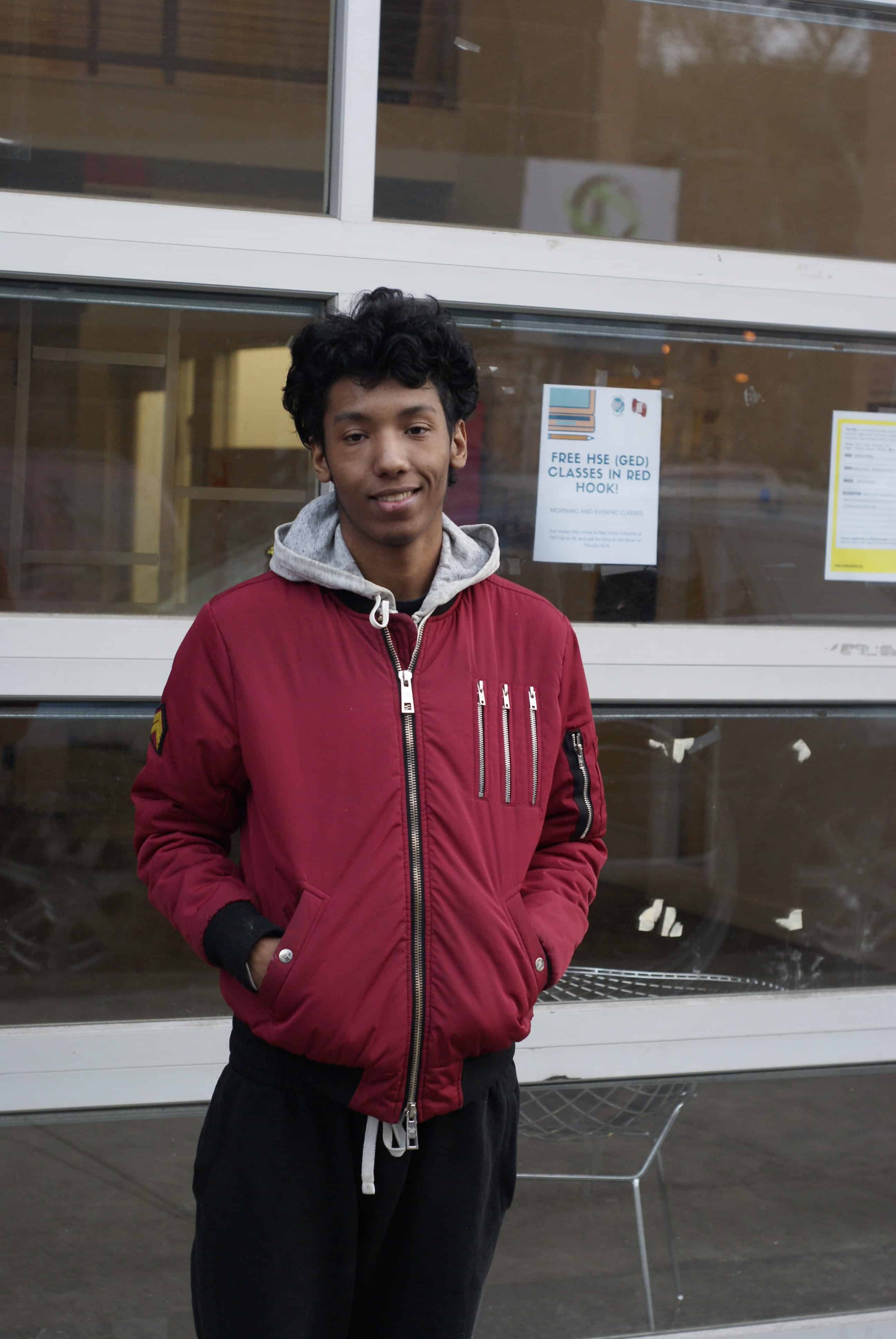
Seated at a table in the middle of a large room, John “Chicko” Texidor’s small frame was exaggerated by the empty space around him. With a flat affect, he patiently detailed a complicated history of personal development.
Though he is now a fellow at the Red Hook Initiative (RHI), a Red Hook nonprofit group focused on youth development, the 20-year-old man walked a long road to get to where he is today.
Growing up in Miami, Chicko’s early life was full of upheaval. “The community I grew up in was pretty rough. There were a lot of drug-dealers, gang-bangers, dropouts,” he trailed off as he fidgeted with his phone.
With a mother in and out of the hospital and an absent father, Chicko depended on his older brother, Chris Texidor, to help him navigate the world he faced every day.
Though he was only seven years older than Chicko, Chris dropped out of middle school to take care of his younger brother. In turn, Chris became a huge influence in Chicko’s life, motivating him to stay in school.
“He’s rough I can tell you that. I didn’t have a dad in my life, so he was always getting tough on me, always getting on my ass,” Chicko said with a brief sheepish smile. “It was hard for him growing up. He grew up fast.”
As Chicko grew up and Chris moved to North Carolina, the young man’s life grew increasingly complicated. Surrounded by people doing drugs and making a living off of identity theft, Chicko made a conscious effort to keep himself out of trouble.
“I was encouraged by my two best friends. They stayed in school and did what they have to do,” Chicko recalled. “My whole family like smokes and does weed. I don’t smoke, I don’t drink. I knew what it does and I hated it as a kid.”
Though he largely kept himself out of trouble, Chicko and his mother found themselves living with friends and relatives, on the brink of homelessness. Without options, the two packed up and moved to New York.
RED HOOK
In Miami, Chicko had grown up wearing baggy shorts and sporting an “old school thug look.” The kids around him played football and soccer. He had grown accustomed to the nice weather and low prices, a slow-paced lifestyle that was somehow easier, despite the constant fighting in school and the joblessness that seemed to plague everyone over the age of 18.
“I called my brother to ask if I could go live with him, but he didn’t want me to come and mess things up for him,” the young man explained.
Instead, Chicko and his mother had to move in with his grandmother, who had lived in Red Hook for 30 years. Like most teenagers uprooted from their lives, Chicko was not thrilled by the move.
“At first, I tried to be excited about it, but I wasn’t happy at all. It was too cold, too different,” Chicko admitted. “The flow was different, it was too fast. People walk fast, talk fast, act fast. In New York, life happens faster.”
Chicko no longer fit in with his surroundings and all he could think of was returning to Florida.
“I tried to fail school to be sent back to Miami,” Chicko admitted. “I got in fights, I was suspended, I was arrested. My mom said, ‘You could keep doing bad, but you’re not going anywhere.’”
Chicko had no choice but to try and adjust. It wasn’t easy, but he was surrounded by people telling him that he could do something with his life.
“Even though I was failing, my teachers told me I could be something if I turned it around. That was my opportunity,” Chicko emphasized. “Here, even the people doing drugs push you to do more.”
Chicko eventually listened, but it took some time and convincing.
During his high school years, Chicko joined RHI at the insistence of a friend. He started out working as a teen chef, coming in just a few days a week. Then, with the support of RHI’s community organizer, Kiyana Slade, Chicko found himself involved in efforts to support community voting for Participatory Budgeting.
“At first I didn’t like it. It felt like school,” he acknowledged. But this negative reaction was only temporary and before long, Chicko was inspired.
A NEW FOCUS
The concept of Participatory Budgeting gave Chicko the feeling of empowerment. The ability to help direct two million dollars towards community betterment really hit home for a young man who had grown up feeling he had no power to shape the world around him.
“I saw it was real. I got into it,” he explained.
Unfortunately, Chicko’s lack of enthusiasm for school had caught up with him and his teachers told him that he would be held back from graduating.
Uninterested in returning school, Chicko prepared to join the ranks of the dropouts he’d observed his whole life. That is when RHI reached out with a plan.
Chicko was offered a position as a facilitator working specifically on Participatory Budgeting, but this offer was contingent on him returning to finish high school.
“I didn’t know what to say,” he recalled. “It was that kind of push that got me to graduate.”
Not only did Chicko graduate high school, in the spring of 2017, he threw himself into the participatory budgeting process and “helped make it a complete success,” getting the votes to fund Smart Tech equipment for Summit Academy.
As his facilitator role ended, RHI kept him on. Chicko “became a voice for RHI,” speaking before crowds and in televised interviews. Over the summer, in an attempt to fight back against proposed budget cuts to Housing and Urban Development, Chicko suggested they organize a mass-protest.
“I was the one who started [the Tenant March],” Chicko noted, “I was like, let’s go to to DC and march like they did for Climate Change.”
When RHI decided to roll out a new fellowship program, Chicko was offered one of the available positions. As a fellow, young adults shadow office workers to build the skills necessary to succeed in their future careers. In Chicko’s case, he began shadowing Catherine McBride, the organization’s Director of Community Building.
“She wants me to understand what it’s about,” Chicko began, explaining the ins and outs of his work in the program. “She’s having me communicate with this guy, Henry. He’s gonna tell me about how he first got started, why he’s a community organizer.”
In addition to his work with RHI, Chicko has been taking classes on youth leadership. His work has inspired him to dream about joining an international group that works on community organizing around the world.
“I love that I can make a change in the community,” Chicko smiled, “Finding a way to bring the community together, that feeling… If you work hard and try, something will happen.”
Through his work, Chicko has had the opportunity to connect with local politicians, form networks, and see the effects his actions have made on his local community. All in all, he can’t help but be proud.
PERSONAL GROWTH
As he looked back on his time in Red Hook, Chicko commented on everything that had shifted, from his views on the neighborhood to his personal attitudes.
“There was a change, my mindset and my attitude changed. In Miami, I was raised to be tough. Being around this community taught me to be more positive,” he mused. “I learned there’s a solution to every problem you have.”
In the future, Chicko would like to take what he’s learned and bring it back to the place where he grew up. “If it’s possible, I would like to make another RHI, maybe in Miami. If I could get something like this in Miami, that would be a game changer. It would change a lot of young lives,” he noted, wide-eyed and emphatic.
Working at the community level has brought change to Chicko that he never foresaw, and this change has pleased no one more than his brother, Chris.
Now on the brink of homelessness himself, Chris wants to hear about all of Chicko’s interviews, he gets excited when his younger brother succeeds and delights in his accomplishments.
“He feels bad, selfish. He says he should have helped more,” Chicko shrugged. “I’m not mad at him, I forgive him. ”
Chicko has come a long way from the angry kid he was when he first showed up in Red Hook.
“I’m a community changer, not just a kid,” he said, a hint of pride escaping his nonchalant demeanor. “I just hope to get more people to follow their path… to want to do more for their community.”









